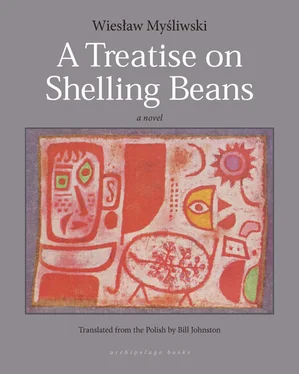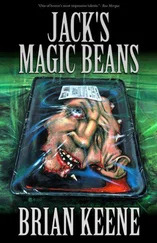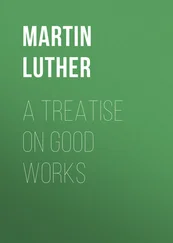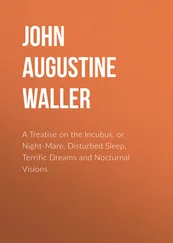Every day over breakfast we’d each have to tell her what we’d dreamed about. And it couldn’t be that no one had dreamed anything. To sleep through the night and not have any dreams? The only exception was grandfather, who never had any dreams. It’s hard to believe, right? Even us children, we always dreamed something. Though according to grandmother our dreams didn’t count yet, because we still got our dreams from our mother or father. She’d say that you only grow into your own dreams through suffering.
You can’t imagine how many dreams she knew. When we were shelling beans she’d tell one dream after another, as if she was pulling them out of the husks. Dreams that belonged to the living. Dreams dreamed by the dead. The dreams of kings, princes, bishops. I remember one time she told about a king who dreamed that a pearl fell out of his crown. No, she didn’t say if he’d actually come to her for an explanation of what the dream meant. But I believed he had, and that he’d brought her the pearl in the palm of his hand. Aside from me, I don’t know if anyone else believed it. Grandfather did for sure, because he believed every story grandmother told. Though it made no difference whether anyone believed it or not. When you’re listening, especially during bean-shelling, you don’t have to believe in what you’re listening to. It’s enough that you’re listening. For me in any case, my heart would stop when grandmother would begin, saying, one time a king had a dream, a prince had a dream, one night a bishop had a dream …
Everyone would be enthralled, whether or not they believed it all. It would go so quiet that if it hadn’t been fall or winter, you could have heard a fly buzzing. Mother and father, Jagoda, Leonka, even Uncle Jan, who didn’t believe in anything anymore. Not to mention grandfather, who would be so intent on listening he’d stop shelling beans. Though the others too, the husks would hang loose in their hands, and the beans would fall much less often onto the canvas sheet. Though father didn’t like kings, he used to blame all kinds of misfortunes on kings, so when grandmother started telling about a king he’d sometimes interrupt her:
“What country was he from? You know, the king. A king can’t be from just anywhere. Ordinary people can, they have to live wherever they find themselves. But not a king. Where there’s a king there has to be a kingdom. If there’s no kingdom, even dreams wouldn’t want him as king.”
Though for the dream it made no difference what country the king was from, and it would often upset Uncle Jan, who was sort of brought back to life from the bean-shelling:
“It’s all nonsense, mother. Dreams are nonsense and waking is nonsense. And kings, they were gotten rid of long ago, how could their dreams still be around.” After which he’d get up and go drink some water.
Mother, on the other hand, she’d always defend grandmother loyally. For mother no dream was dreamed in vain, whatever it’s meaning was, and people should know what it meant. Because it was worse not to know than to know the worst. So grandfather, who believed that all dreams came from God, would praise grandmother’s wisdom all the more:
“All those learned folks and ministers and priests, while she never studied at all and yet look what she knows.”
And every morning, as we were eating our ?urek soup with potatoes, amid the slurping and the clatter of spoons against the tin bowls, when grandmother would ask who had had what dreams and would try to explain them all, grandfather would be so filled with admiration at how clever grandmother was that he’d pause with his spoonful of soup or potatoes halfway to his mouth. At times the soup would spill on the table, or a potato would fall off the spoon, and grandmother would tell him off:
“Don’t make such a mess.”
But he’d have to give words to his admiration:
“How about that. You wouldn’t even know what you’d dreamed about if she hadn’t explained it for you. Dreams really are a second life once they’re explained to you. But for that you need to be smart, sharp as nails. Smart enough to take you into the next world and beyond.”
He never could forgive himself for not having dreams. When he fell asleep it was like he’d died. Then when he woke up it was like he was rising from the dead. But between the falling asleep and the rising from the dead there was a big gap. If he’d ever felt like counting up all those gaps, it would come out that a third of his life he wasn’t in the world. He couldn’t even dream anything from wartime, though he’d been through four wars in his life. He fought in one of them, got wounded, he had this huge gash from a bayonet in his stomach. But he was fine. Maybe if the bayonet wound had hurt, but it hadn’t hurt him a bit, quite the opposite, he’d felt such a surge of strength that he killed the guy that stuck the bayonet in his belly, and the guy’s two buddies as well.
When it came to wars, grandfather was just as much an expert on them as grandmother was on dreams. No one was his equal about wars. Wars were the milestones that prevented him from getting lost in his memory, in the world. He stuck to wars like they were familiar paths, whatever he happened to be talking about. When someone else would tell a story, grandfather always asked which war it happened after or before. Grandfather’s memory was made up of wars instead of calendars or saints’ days. Wars were more important than the seasons, above wars there was only God. According to grandfather, time moved from one war to the next. And in the same way, wars marked out space much more accurately than maps. Everything that happened, happened where there was a war. And everything happened after the last one, before the last one, after the one before it, before the one before it, or before the one even before that. He even remembered that war. He remembered that his father, which is to say my great-grandfather, had fought in it, and he’d been wounded, though in the head, not in the belly. And from great-grandfather’s memory he also remembered an earlier war that great-grandfather remembered from the memory of his own father, that is, grandfather’s grandfather, and it had a particular name, and that was even before the other one, when neither me nor any of you were in the world, he’d say.
You’d have gotten lost in all those wars if you’d listened to grandfather. He was so meek and helpless in it all. You’d never have imagined he could have been a soldier. All the more that he could have killed someone. He couldn’t kill a chicken. He’d put its head on the chopping block, lift the ax and just stand there till someone came out of the house and took the ax from him and brought it down on the chicken’s neck. Or he’d grumble about the moles that were digging up the meadow. The damn things wouldn’t stop burrowing, pretty soon there wouldn’t be a meadow anymore, just endless molehills. He’d go out with a spade, stand over one of the molehills, and even though he knew perfectly well that the mole was frisking about inside, he’d always say that something held him back from driving the blade of the spade into the molehill. Supposedly he was waiting till the mole was sure it was safe, so it’d come closer to the surface. He’d be holding his breath, standing stock still, poised to sink the spade in, and he’d tell himself, now, do it now, but something would hold him back. He would have hit it for sure, the mole was already poking its little snout outside, he would have sliced its head off without any problem, the blade was sharp as a razor, he’d sharpened it specially beforehand. But something stopped him. Evidently the thing that stayed his hand was stronger than he was.
I heard that one time the mole actually came out of the molehill and the two of them just stood there, grandfather and the mole, looking at each other. And grandfather got this feeling as if it weren’t a mole he was about to kill. And he said:
Читать дальше












